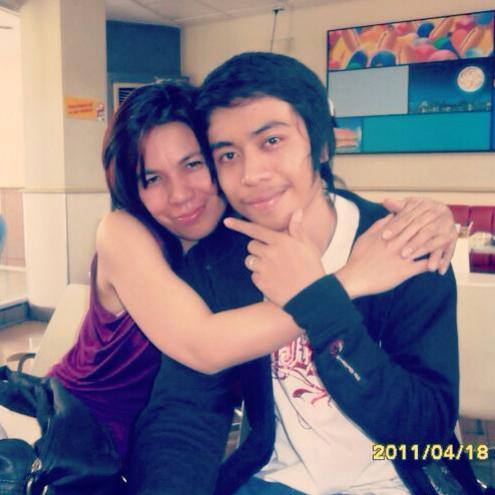by Lesley Valiente and Sarah Salise
Kenneth Aldovino stood in the brittle cold after receiving an envelope from the mail this past 21st of January. The letter was disheartening: it was from Citizenship and Immigration Canada letting him know his permanent residence application had been denied, and he was asked to leave the country before the end of the month.
Aldovino has been in Canada for just six months. Edna Aldovino, his mother, had learned she had terminal cancer back in February 2011. Since her diagnosis, she had longed for her son, to be with him in her last days. But she was a live-in caregiver, faced with the choice of returning home or staying in Canada working to complete the requirements of her program before her son Kenneth could be eligible to join her. Mother and son spent only a week together before Edna’s passing in July 2013. And now Kenneth is being told to leave.

Edna Aldovino appearing with her son in 2011, before she migrated to Canada to be a Live-In Caregiver.
Citizenship and Immigration Canada (CIC) policy states that the processing of Kenneth’s application stops with the death of his mother, the primary applicant. But Kenneth is asking for the right to carry on his mother’s residency application.
From 2009 to 2012, Edna came to Toronto to work in the Live-in Caregiver Program (LCP), wherein she sought to complete all the requirements to make her and her family eligible for Permanent Resident status. When she was diagnosed with a terminal cancer and needed to undergo chemotherapy sessions, she forced herself to continue working in the hope that she would complete the requirements. Most Canadian workers would have taken a leave of absence to focus on fighting the disease, but such ‘privileges’ are not afforded live-in caregivers like Edna, with their precarious legal and economic status.
The LCP exists to attract women’s labour – almost completely from the Philippines – to perform care work for the young and elderly at a wage and under conditions that many women in Canada simply would not tolerate. To qualify for permanent residency, live-in caregivers (LICs) must complete 3,900 hours or 24 months of authorized full-time work in the span of four years. In Ontario, they earn the minimum wage of $10.86 per hour and work 48 up to 56 hours in a week. Furthermore, living with their employers severely limits the privacy that live-in caregivers have, making them vulnerable to abuses such as working irregular hours and not having their overtime accounted for.
In case of a worker’s death, the CIC policy leaves sponsored dependents, mostly children, cut off from receiving what their parents struggled for. Unfortunately, Edna’s years of hard work and sacrifice will not fulfill their purpose of bringing Kenneth to live in Canada.
On January 27, an urgent meeting of migrant, refugee, and Filipino community groups agreed to campaign around the call to ‘Let Kenneth Stay’. Task Force Kenneth was formed to push for his right to the permanent residency that his mother earned. Letters of support are being collected; and online petitions are being circulated to encourage Canada’s Immigration and Citizenship Minister Chris Alexander to use his discretionary powers and allow Kenneth’s permanent residency application to be processed.
Having lost his mother so early in life, Kenneth will face great difficulty if forced to return to the Philippines where he will have no family and no financial support. In fact, thousands of young, educated Filipinos leave the Philippines every day for jobs abroad as a result of the country’s Labour Export Policy, which pushes its citizens out of the country to become highly exploited labour for imperialist countries like Canada. The lack of a viable and independent national industry in the Philippines is not only driving workers out of the country by the millions, the underdevelopment of the country further benefits corporations in the imperialist countries by having no domestic competitors to their exports to the Philippines. This is why women like Edna are forced to “tolerate” working conditions that many workers in Canada would not.
According to Anakbayan Toronto , a Filipino youth organization, there is a bigger issue at play in cases such as Edna’s: the lack of stable status accorded to workers under the Live-In Caregiver Program. Since caregivers are seen as a source of “temporary work” and not as immediate candidates for citizenship, these workers must migrate to Canada alone, undergoing a complete separation from their families.“The Labor Export Policy, pushed my mother to leave the country for a better job and has since continued to force 5,000 Filipinos everyday, as the lack of national industrialization has created unemployment and high underemployment in the country” stated Rhea Gamana, Chairperson of Anakbayan Toronto.
Edna is one of the several thousands of citizens who migrate abroad every year seeking better salaries. She left home in 1999 when Kenneth was just five years old and worked in Taiwan, Kuwait, Singapore and Hong Kong before coming to Canada. In addition to the emotional strain of being away from one’s family, live-in caregivers undergo difficult working conditions, finding themselves on-call around the clock, as the needs of the elderly and of the young for whom they care do not end after an 8-hour workday. Such arduous labour takes a physical toll on the body after time, and it is not surprising to find that many caregivers, like Edna, eventually develop serious medical problems.
Denying Edna’s wish to see her son gain permanent residency renders her years of hard work and ultimate sacrifice – her loss of life – meaningless. The Live-In Caregiver Program must not inflict any more injustices on the Aldovinos and future migrant youth. It’s the least Canada owes to Kenneth after his mother’s sacrifice. Let Kenneth Stay!
Comments
